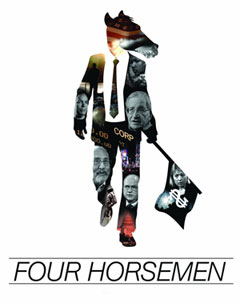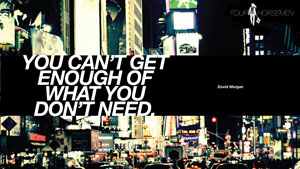
Four Horsemen

FOUR HORSEMEN (DOCUMENTARY)
Guerilla Films
Release date: March 14th, 2012
Running time: 97 minutes
Writer & Director: Ross Ashcroft
Producer: Megan Ashcroft

“Societies in decline have no use for visionaries.”
~ Anaïs Nin
My grandmother lived through the Nazi regime and World War II. As a teenager, I would ask her how Hitler could have happened and why so few people did something about it. This was the first time I heard a variation of the “ignorance is bliss” theme — and a truth I only began to understand later in life.
When things change gradually, little by little, day by day and over years, and if those changes don’t seem to affect your personal life in bad ways, she said, why should you doubt that everything was going to be alright? As long as you still have something to lose, you won’t see the catastrophe happen until it’s right at your door, and then it’s too late.
Four Horsemen, in large parts, builds on this simple insight. Director Ross Ashcroft begins his essay with the premise of a “cognitive map” which determines our perspective on the world at large — and might be seen as the modern-day battle field where the fate of this civilisation will be decided upon.
On the surface though, the feature meticulously dissects the clockwork of the global economy and the catastrophic implications if the people who rule the world are allowed to see their agenda through. The film does so in simple terms and with easy-to-follow graphics.
Given the subject and the factual foundation of the documentary, its title seems neither far-fetched nor exaggerated. Though everybody might read the writings on the wall differently, the film makes its case convincingly when it comes to the modern-day “Four Horsemen of the Apocalypse”:
— A rapacious financial system —
— Escalating organized violence —
— Abject poverty for billions —
— Exhaustion of Earth’s resources —
The filmmakers interviewed 23 more or less well-known thinkers — not only experts like Noam Chomsky, Philip Blond and Richard Wilkinson, but people who used to work within “the system” and talk about their first-hand experiences. The interviews  are frank and insightful throughout, lacking the bumbledom we often get to hear in documentaries on these matters.
are frank and insightful throughout, lacking the bumbledom we often get to hear in documentaries on these matters.
Maybe the fact that many of the interviewed have been marginalised led to the, in my opinion needless assurance at the beginning of the film that “Four Horsemen doesn’t get involved in banker bashing, criticising politicians or conspiracy theories”.
The film would not need a pre-emptive “defence” against accusations of scaremongering, a communist attitude or esoteric tendencies whatsoever. Ashcroft relies on facts, historical and current, and he hardly ever offers interpretations. Latter are more or less obvious, making Four Horsemen a compact re-cap for people who have been aware of the facts, and an evocative primer for those who sense that “something is wrong”.
At its core though, the film is maybe less about the causes of a global crisis turning catastrophe than the fact that “we are not encouraged to question the accepted  norms.” In many parts, the message seems to be that ignorance, inaction and the inertia of the wider populace are a demagogue’s best friends, and ultimately they might be the only reason why Society is not yet crumbling.
norms.” In many parts, the message seems to be that ignorance, inaction and the inertia of the wider populace are a demagogue’s best friends, and ultimately they might be the only reason why Society is not yet crumbling.
Notwithstanding the latent instability of the world, any “system” can only stay afloat through participation of the majority. This requires a constant propagandistic effort by the elites, and although Four Horsemen makes this very much clear, it stops short of actually analysing mainstream media. Given the scope of the film, it is not enough to state the linkages and the influence of the most powerful opinion makers.
After all, this is where the “cognitive map” for most people is drawn, and to my mind there lies the crux of real change. On this note, it’s an unfortunate omission not to discuss the role and influence of social networks that shape the minds of millions.  Though Four Horsemen points to the Internet as a new source of knowledge and human connection, the documentary doesn’t really explore the role of the “world wide web”, let alone the fact that the free internet has already become an endangered institution.
Though Four Horsemen points to the Internet as a new source of knowledge and human connection, the documentary doesn’t really explore the role of the “world wide web”, let alone the fact that the free internet has already become an endangered institution.
However, Four Horsemen is one of the few documentaries that take on the foundations of the modern world and do not fail to look at solutions. Whether or not you think those solutions are viable may not be the most important thing to ponder. It’s more about the awareness that solutions are at hand, and there I very much appreciated the optimistic undertone of Four Horsemen.
Ultimately, the film discusses a different model of progress beyond apocalyptic scenarios, and makes the fact that we might soon have to swing on a thinner material hammock seem less dramatic than it might sound. It’s about taking personal responsibility, a new way of thinking and last but not least self-education. One day, it might just save our lives — and make the lives of coming generations a lot better.

Jonahh Oestreich
One of the Editors in Chief and our webmaster, Jonahh has been working in the media industry for over 20 years, mainly in television, design and art. As a boy, he made his first short film with an 8mm camera and the help of his father. His obsession with (moving) images and stories hasn’t faded since.
You can follow Jonahh on Twitter @Jonahh_O.
© 2022 STATIC MASS EMPORIUM . All Rights Reserved. Powered by METATEMPUS | creative.timeless.personal. | DISCLAIMER, TERMS & CONDITIONS
HOME | ABOUT | CONTACT | TWITTER | GOOGLE+ | FACEBOOK | TUMBLR | YOUTUBE | RSS FEED
CINEMA REVIEWS | BLU-RAY & DVD | THE EMPORIUM | DOCUMENTARIES | WORLD CINEMA | CULT MOVIES | INDIAN CINEMA | EARLY CINEMA
MOVIE CLASSICS | DECONSTRUCTING CINEMA | SOUNDTRACKS | INTERVIEWS | THE DIRECTOR’S CHAIR | JAPANESE CINEMA





